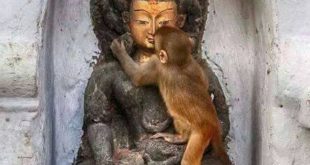Karma is so called because it makes whatever is made. Moreover, there are two kinds of karma; karma depending on ignorance, and other karmas.
There are six karmas depending on ignorance; namely, the triplet consisting of meritorious karma, de-meritorious karma, and karma leading to immovability; and the triplet consisting of bodily karma, vocal karma, and mental karma. All these are nothing but worldly meritorious and de-meritorious thoughts.
The other karmas are four in number; namely, static karma, constituent karma, active karma, and strenuous karma.
In such phrases as “All the constituents of being are transitory,” static karma is meant; namely, all the elements of being possessing a dependence.
In the commentaries, all the elements of being, both those with form and those without, which have sprung from karma, and are comprised in the three modes of being, are called constituent karmas. They are included in the phrase, “All the constituents of being are transitory;” but there is no passage quotable for them separately.
Meritorious and de-meritorious thoughts belonging to the three modes of being are, moreover, active karma. For them is quotable the passage, “This ignorant individual, O priest, performs meritorious karma etc.”
Bodily and mental heroism is called strenuous karma. This is quotable in the passage, “It went as far as there was room for karma, and then it stopped, as if struck in the axle.”
But there are not merely these, there are also others. In such quotations as, “Brother Vis¤kha, when any priest enters upon the trance of the cessation of perception and sensation, first vocal karma ceases, then bodily karma, and then mental karma,” several karmas are mentioned, but there is no one of these that is not included under static karma.

 NEWS.NIRBANKAMI.COM NEWS.NIRBANKAMI.COM
NEWS.NIRBANKAMI.COM NEWS.NIRBANKAMI.COM

